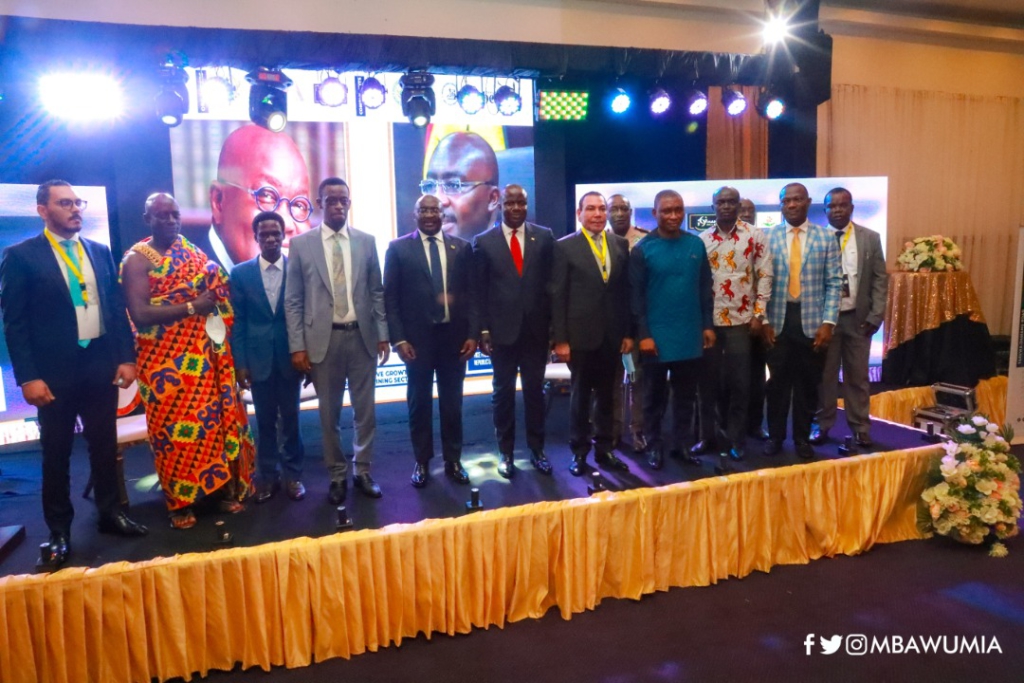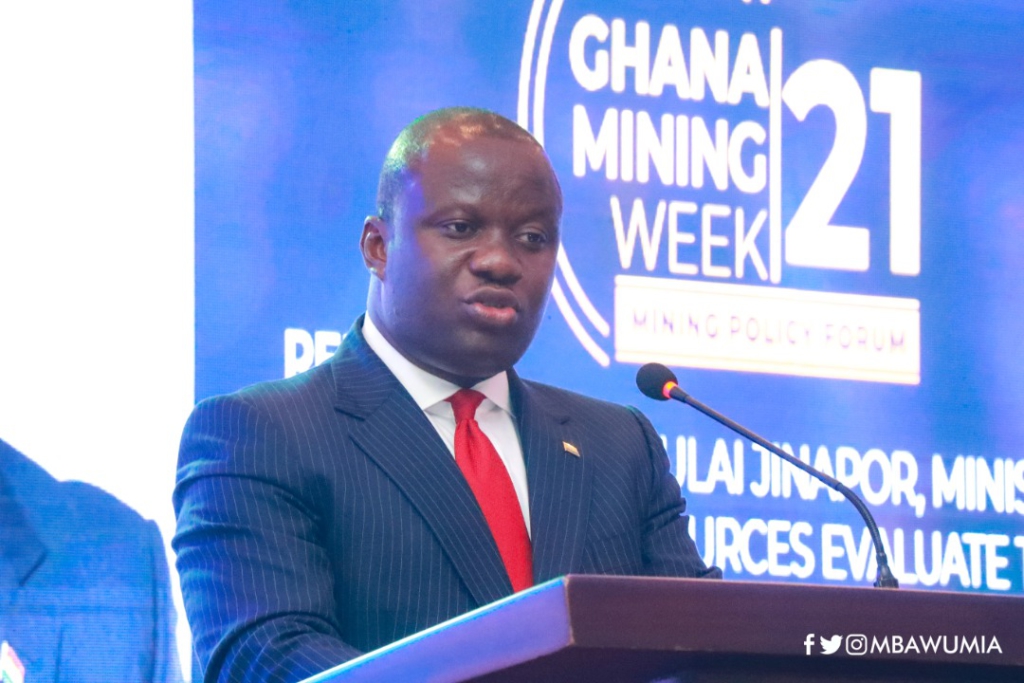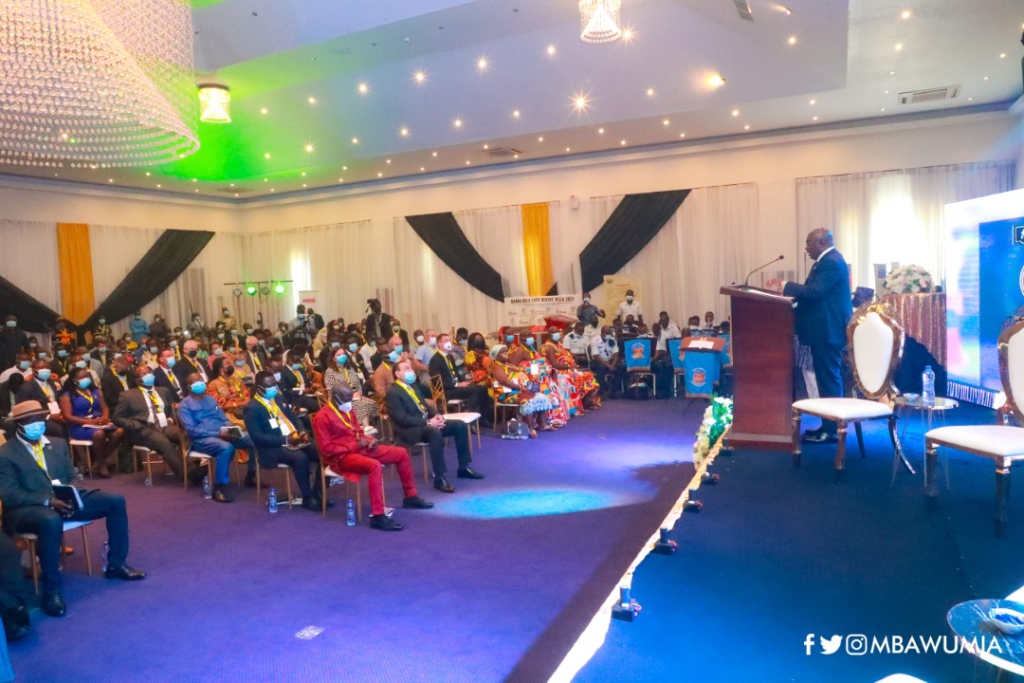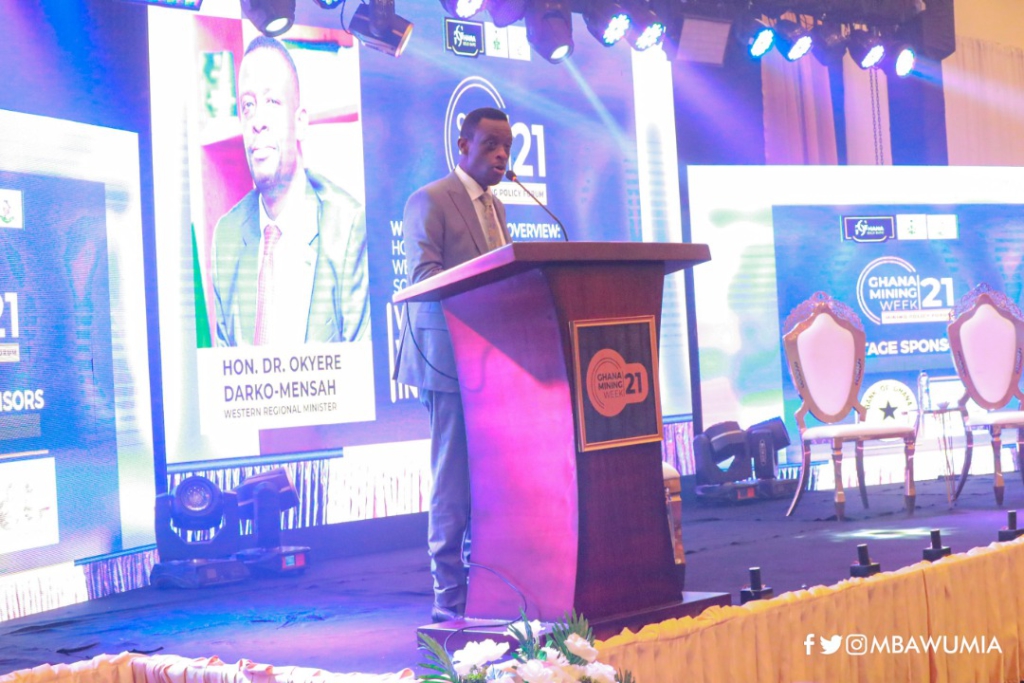Government is putting in a lot of measures to stimulate job creation in an integrated and inclusive manner throughout the entire gold mining value chain, Vice President Dr. Mahamudu Bawumia has indicated.
This integrated, inclusive chain will bring together large scale, small scale, sustainable community miners as well as other stakeholders such as refiners, purchasers and sellers of jewellery in an effort aimed at increasing the value Ghana derives from her raw materials and also bring clarity on the volumes and value of extracted materials.
The Vice President shed more light on government’s plans when he gave the keynote address at the opening ceremony of the Ghana Gold Expo 2021 (Ghana Mining Week ’21), a mining policy forum, in Takoradi on Thursday, July 1, 2021.
The two-day forum brings together key stakeholders including the Minister for Lands and Natural Resources, Samuel Abdulai Jinapor; members of the Parliamentary Select Committee on Mining, large and small scale miners, traditional rulers, and members of the Diplomatic Corps to deliberate and chart a sustainable path for Ghana’s gold industry.

Speaking on the challenges in the mining sector and measures being put in place to address them, Vice President Bawumia stated that “it is well-known that the rise in illegal mining has, no doubt, been fueled not only by unemployment but also by the desire of the average community members to have a feel of the minerals.
“In this regard, government is putting in a lot of measures to stimulate job creation in an integrated and inclusive manner throughout the entire gold mining value chain.
“I am reliably informed by the Minister for Lands and Natural Resources that 20 Community Mining Schemes have begun, each employing about three thousand (3,000) persons. We expect to have a hundred of such schemes by the end of the year, and with each employing 3,000 it will make a significant impact in addressing unemployment in mining communities.

“Government is providing them with equipment and new technology that requires very little water, sometimes just a barrel, to extract the gold from the ore without using zero mercury or cyanide. This is sustainable mining that addresses the issue of galamsey, and with ready buyers such as the Bank of Ghana and the local refineries that are being set-up, we can confidently say we are building an integrated, inclusive gold industry,” he explained.
Disclosing that artisanal small scale mining accounts for 50% of Ghana’s gold production, Vice President Dr. Bawumia said the Bank of Ghana, through the newly introduced Gold Purchase Programme, will focus its purchasing attention on this sector as it works to strengthen future macroeconomic management and shore up the Cedi with real gold backing.
“Ghana is Africa’s largest gold producer, having overtaken South Africa in 2019. But the Bank of Ghana holds just 8.7 tonnes of physical gold in its reserves. For nearly three decades, almost 60 years, we have not added an ounce of gold to our reserve holdings. In comparison, Ghana’s gold reserves are equivalent to only 6.9 percent of South Africa’s gold reserve holdings of about 125.3 tonnes.

“Thus, the decision by the Bank of Ghana in June 2021 to implement a Gold Purchase Programme is very welcomed. The benefits are enormous, and we can only hope and encourage the Bank to continue with this initiative.”
The setting up of local refineries, such as one by the Precious Minerals Marketing Company (PMMC) and Gold Coast Refinery, would further broaden the market for sustainably mined gold, fill in a missing part of Ghana’s extractive sector while seeing to the growth of local refining, Dr Bawumia stated.
Expenditure Leakages
The private sector is also being supported to build their capacity and reverse the significant expenditure leaks from the domestic economy through the importation of several tools and equipment, which Ghana has the capacity to produce, he emphasised.

“We are equipping the private sector in ways to fill these leakages and build capacity for such production locally. We are doing this by working closely with industry and academia, like the University of Mines, to equip young professionals with the skills required to operate competitively in the sector and perform innovative researches.”
With all of these measures falling into place, the future of Ghana’s gold mining sector is bright, Dr Bawumia declared.
“I believe with our structured efforts of integrating the mining industry to propel local industries, the entire mining value chain would be ready to create jobs, and we intend to tap into it to develop our economy. Going forward, Ghana cannot, and would not continue to be merely exporters of just minerals and other raw materials to other countries.”
Latest Stories
-
Trump says ‘many elements’ agreed to ahead of Putin call
2 hours -
Messi left out of Argentina’s next World Cup qualifiers
2 hours -
Maame Samma Peprah takes over as Ag. Registrar of Companies, pledges teamwork and continuity
3 hours -
King Charles meets Carney in symbolic support for Canada
3 hours -
Police release new evidence in timeline of Gene Hackman and his wife’s death
3 hours -
Netflix drama Adolescence hailed as ‘flawless’ TV
3 hours -
No novelty, NDC just changed funding route – Amin Adam on uncapping GETFund
3 hours -
Club apologises after minute’s silence held for ex-player who is still alive
4 hours -
This incident has awakened us, Mahama has taken interest – Health Minister on opioid seizure
4 hours -
Gov’t introduces or scraps tax based on times, this isn’t the first taxes removal – Amin Adam
4 hours -
Pharmaceutical Society of Ghana reschedules Pharma Excellence Awards to April 11, 2025
4 hours -
Safe-haven gold clears $3,000 for the first time
5 hours -
Scrapping of nuisance taxes poses risk to government’s revenue target – Deloitte
5 hours -
Forever 21 files for bankruptcy in the US
5 hours -
Ghana’s expected growth rate of 4% reasonable and achievable – Deloitte
5 hours

